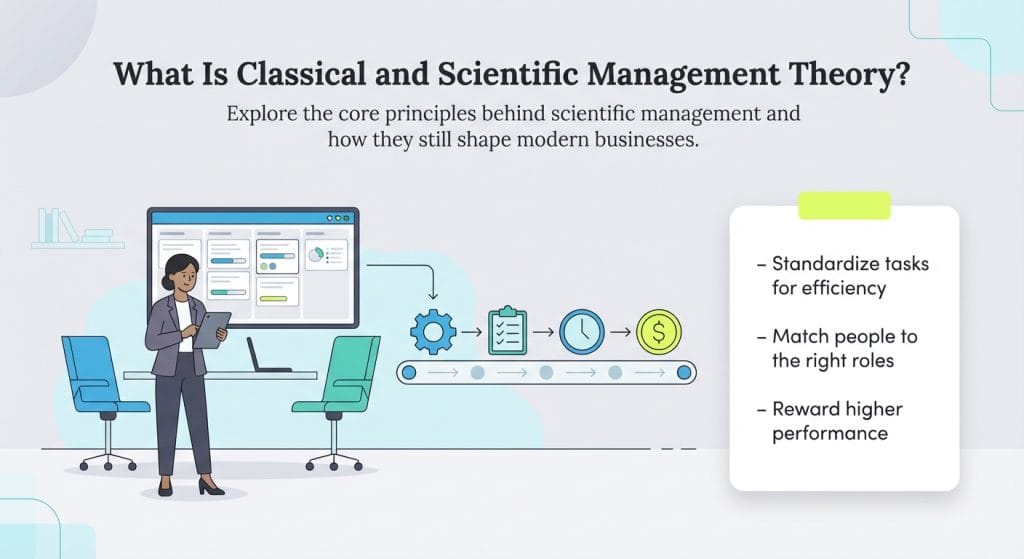The evolution of industries and technology over the past century has been momentous. We could never have imagined the way our lives would look now back in the early 1900s. However, the ideas and management theories developed during that time, such as classical management theory, can still apply to the work we do today — if incorporated correctly.
Classical management theory offers techniques and ideas based on human behavior and scientific logic observations. Here’s everything you need to know about classical and scientific management theory to implement it into your business successfully.
What is classical and scientific management theory?
Scientific management theory, also called classical management theory, entered the mainstream in the early 1900s with an emphasis on increasing worker productivity. Although life has changed greatly since then, there are still many ways that classical management theory can benefit your business today.
Developed by Frederick Taylor, the classical theory of management advocated a scientific study of tasks and the workers responsible for them. Scientific management theory aimed to provide workers with the tools necessary for maximizing their efficiency and output. The theory requires managers to observe employees thoroughly as they complete tasks to determine where problems arise and how time is lost.
With their new knowledge, managers can break down projects into a series of assignments. From there, they can appoint the person who is the best fit for each task based on their individual skills. The scientific theory of management is considered suited to businesses better based on repetitive tasks, such as a factory.
The classical management theory has been criticized for creating an “assembly line” atmosphere, where employees do only menial jobs as quickly and effectively as possible. Its focus on productivity can push aside the needs and well-being of the workers completing the tasks. For this reason, it has fallen out of favor among many companies and schools of thought.
However, some of this criticism stems from a misunderstanding of Taylor’s theory. “If you actually go back and read the Principles of Scientific Management (his core book), what he wanted to accomplish is that for every job in a factory, say, there was an optimal way to do that job,” Rita McGrath, a strategy professor at Columbia Business School and author, clarified. “The world has forgotten … that Taylor wanted to use his scientific breakthroughs to improve the lives of workers and to have workers and management working together.”
To understand if classical management theory is best for your organization, you need to know the foundation of it. Classical and scientific management theory is based on four main principles:
- Company leadership should develop a standard method for doing each job using scientific management.
- Workers should be selected for a job based on their skills and abilities.
- Work should be planned to eliminate interruptions.
- Wage incentives should be offered to encourage increased output.
The main principles can be applied to a variety of contemporary industries beyond production in a factory. They encourage managers to be observant and present in daily office activity, employees to excel in their roles, workplaces to be focused and organized and employees to be financially rewarded for the work they complete.
Many elements of classical and scientific management theory are already integrated into contemporary business practices.
How do you implement classical management theory into your business?
As a small business owner, you may already unknowingly rely on the principles of classical management theory, as it’s deeply ingrained in everyday business practices. “When you use an algorithm, order something online, build a supply chain or do anything else involving the movement of physical goods, you’ve been using a process influenced by Taylor,” offered McGrath.
Here are a few ways to implement classical management theory in your business.
Assess your current management style
Prior to making any changes in your company’s leadership style, review your current management methods and their effectiveness. You may find strengths, weaknesses or issues you weren’t aware of and these could affect what kind of management theory is most appropriate for your organization. With a thorough understanding of how your company operates, you can implement a new method more smoothly and quickly.
You may find similarities between your current management style and classical and scientific management theory or you may find major differences. Those latter areas are where you will need to practice patience and prioritize education as your employees transition and adapt to the new style.
Clearly outline responsibilities
Review each role at your company. What do you expect each employee to be doing? What work are they doing? From there, you can recalibrate the scope of each role and formalize a list of responsibilities.
When roles are defined, each member of your team knows exactly what is expected of them. Everyone can work on projects that fall directly under their jurisdiction, using their experience and skills to work more productively. You may find holes in your workforce and need to create new positions to fill them to relieve any strain on your existing team. If your employees understand their roles and responsibilities, they are less likely to experience burnout.
Provide management training for leadership
A key part of adopting any new management style is understanding the basics of managing employees and the complexities of change management. Lay a solid foundation for your change to the scientific school of management by helping your leadership refine their management skills. Since classical and scientific management theory places such an emphasis on hierarchy, you should have a clear sense of which employees are managing others.
Ensure that anyone at a managerial level understands both the changes you want to make and why you want to make them. They should be able to explain the concepts clearly to their direct reports. Outline with your managers how they will support your new management style. You can use regularly scheduled check-ins, an open-door policy for questions or a checklist review process.
Implement monetary rewards
Classical and scientific management theory prioritizes rewarding employees for their work. If you want employees to work harder or sell more products, incentivize them with commissions or bonuses. Conduct yearly performance reviews and provide performance-based raises to each employee. Fair compensation will make your employees feel appreciated and give them a real reason to go beyond their required duties.
It is also important to clearly outline the necessary accomplishments required for promotions as well as what salary will be attached to those promotions. When your employees know exactly what is required to be able to work at a higher level, they can work toward that goal — and know what they can expect from a new role. If your business cannot afford regular monetary rewards or salary increases based on performance, figure out other valuable ways you can reward employees. In place of bonuses, you could offer additional paid time off. [Related article: Why You Should Pay Your Employees to Stop Working for You]
Hire a consultant
Any change made at the management level requires careful planning and constant communication with employees to help them understand the transition. Shifting from one management style to another involves a complete overhaul of how your company functions. Rather than tackle all of this on your own, you may want to consult a management trainer or consultant, who has overseen the process before at several other companies and who has an in-depth understanding of the management style you’ve chosen.
Before locking in with a particular consultant, ask for references and make sure they have successfully implemented the management theory you hope to use. You shouldn’t waste resources on someone who is not an expert in the service you need them to provide. Ask how they will make the necessary changes and how they plan to follow up on them. Will you be able to contact them in the future about questions related to the change or would you have to pay an additional fee for such follow-up consultations?
When implementing any new management style, including scientific management theories, educate all employees, not just management, about how the method works and what it means for them. This will help the entire organization transition more quickly and promote teamwork by making all employees feel they are an important part of the success of the new process.
Planning ahead for changes in your company’s hierarchy and workflow is a must. Adjustments can only be implemented effectively if all stakeholders are aware of their new responsibilities.
Alternatives to classical and scientific management theory
Beyond Taylor’s theory, other management approaches can support effective oversight when applied correctly. As your business evolves, certain theories that were once relevant may lose their effectiveness, while others may better align with your business in its current state.
“Management theories inform what leaders believe will be the outcome of a set of choices and actions that they take,” McGrath said. “As the world around you changes, you need to update your theory to accommodate what academics call a new set of boundary conditions (under what circumstances will the theory work?).”
Here are some additional management theories to consider implementing in your business.
Contingency management theory explained
Contingency management theory is attributed to Fred Fiedler and is sometimes called Fiedler’s contingency model or Fiedler’s theory of leadership. Contingency theory asserts that there is no one right way to lead a business, instead arguing that leaders should be self-aware enough to identify their individual strengths and weaknesses and the favorability of the situation. From there, leaders should tailor their workflow and management practices appropriately.
Covey management theory explained
Covey management theory is named for Stephen Covey, author of the leadership classic The 7 Habits of Highly Effective People. Covey’s management theory adheres to the same habits named in his book: Be proactive, think of the future, prioritize, consider everyone’s needs and desires, listen and understand, synergize for creative cooperation and allow for self-care.
Follett management theory explained
According to social worker and management consultant Mary Parker Follett, management is “the art of getting things done through people.” Follett’s management theory advocates for direct contact between employees and managers, the continuous negotiation of duties between management and workers and autonomy and accountability on the part of individual leaders.
Fayol management theory explained
Fayol management theory is named for Henri Fayol, an early leadership and economic theorist. Fayol argued that managers must set clear guidelines and processes for their organization and their workers; effectively and systematically divide work among employees; and ensure compliance, collaboration and group movement in one direction.
Juran management theory explained
Juran management theory is attributed to Joseph Juran, an industrial quality control technician who was a part of economic revitalization efforts in Japan after World War II. Juran’s theory is anchored by three fundamental stages: quality planning, quality control and quality improvement.
Kanter management theory explained
The management theory of Harvard University’s Rosabeth Moss Kanter focuses on developing a positive work environment and processes. Sometimes categorized as a form of change management, the central premise of Kanter’s management theory is that superior products and performance will result from well-managed work environments and work processes that support and encourage workers.
Mayo management theory explained
Australian industrial relations author George Elton Mayo’s management theory is foundational in management thinking, as he is credited as being the first theorist to attribute worker motivation to anything other than pay. Sometimes called the “father of HR” and the “father of scientific management,” Mayo developed a framework to understand employee motivations — namely, of group norms and cohesiveness — that is still used today.
Mintzberg management theory explained
Canadian academic and author Henry Mintzberg’s management theory hinges on his assertion that employees acquire skills over the course of years of experience and training, rather than solely in the classroom. Mintzberg advocates for clear structure within a company, so managers and employees understand and can complete their roles and responsibilities.
Max Weber is also known for his work as a political scientist.
Weber management theory explained
Max Weber’s management theory, also called bureaucratic management theory, emphasizes the importance of an organization’s bureaucracy and its processes to direct employees. According to Weber, the ideal business treats all employees equally and systematically divides tasks according to employee expertise.












